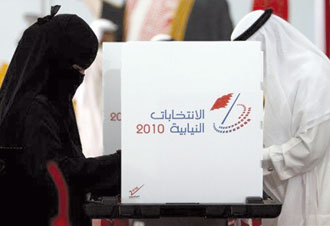
|
 |
 |
|
|
|
|
|
|
|
|
|
|
|
|
|
|
|
|
|
|
|
|
|
|
The New Parliament: A Chance to Promote
|
 |
The main role of Parliament is to legislate and supervise. The former involves proposing, amending or rejecting laws, whilst the latter implies supervision of government practices, and holding it accountable for its actions through specific mechanisms such as questioning, discussing and withdrawing confidence. Other roles include debating the general budget, supervising government spending and the distribution of resources, ratifying financial and economic laws, endorsing economic agreements and partnerships with other countries or regional and international organizations.
Despite certain reservations regarding its performance during its previous sessions (2006-2010), Bahraini Parliament was successful to a certain degree for ratifying 112 laws, 270 bills and 619 proposals. It also succeeded in: establishing 12 parliamentary investigative committees; pushing the Government to increase financial support for housing projects; paying subsidies for the homeless; and increasing salaries to combat inflation during 2007-2008.
The Bahraini Parliament also adopted and ratified many laws related to human rights including: the International Covenant on Economic, Social and Cultural Rights in 2007; the International Covenant on Civil and Political Rights in 2006; combating trafficking in persons law in 2008; the Suni section of the Family Law in 2009; ratifying the UN Convention Against Corruption in 2010. However, the Parliament was criticised locally and internationally for ratifying the Anti-Terrorism Act, which contains gaps regarding the legal assurances for the accused.
The performance of the last Parliament was below the expectations of voters due to the new experience of the Bahraini Parliament, the accumulation of problems, the weak cooperation between the Legislative and Executive Authorities and the lack of harmony between the various blocks inside the Parliament. Will the newly elected Parliament be better than the previous one in terms of performance and achievements?
Firstly: it is difficult for the Parliament to succeed in the public services sector without Government cooperation and vice versa: the weakness in Parliament’s performance reflects on the performance of the Government in public services. Coordination between the Legislative and Executive Authorities will help both succeed, and this will aid the success of the reform experience itself.
Secondly: MPs should pay more attention to human rights, as promoting human rights and introducing the relevant laws and legislations will contribute to the promotion of social and political stability, as well as enforcing security in the country. Moreover, new MPs should also strive to increase their human rights achievements by promoting public freedoms, preparing programmes, and drafting resolutions and plans where both Parliament and the Executive Authority coordinate. This is in order to protect the dignity of human beings and their rights, and to prevent any restrictions, whatever the reason, and under any name.
There are many reports by international organizations which point to the occurrence of human rights violations. Parliament can investigate these allegations, and also has the authority to question ministers regarding any breaches that may have taken place.
Thirdly: MPs should pass the Press Law, which has been delayed for seven years. This is because the absence of any law regulating the work of the press and media (whether published, broadcast or online) will open the way for wrong interpretations, which may in turn lead to violations of freedom of expression. This can also be applied to the law that regulates the work of local NGOs, which has been delayed or perhaps even completely ignored.
Fourthly: one of the most important roles of the Parliament is to uncover corruption by enforcing the anti-corruption law (Law No. 7 for the year 2010), and encouraging the activities of parliamentary committees, in order to promote transparency and protect public funds.
Finally, periodic meetings should take place between MPs and voters, in order to inform them of any progress with regards to the promises made during election campaigns. Such meetings will promote trust between an MP and his/her voters, and in the new democratic experience itself. However, there are shortcomings among some MPs, which could affect their performances, and it is possible to tackle this problem through training and workshops designed to build MPs’ abilities, strengthen their performance and skills.